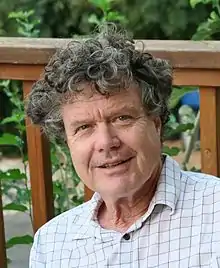Ronnie Kosloff
Ronnie Kosloff (born July 26, 1948 in Los Angeles, California) is a professor of theoretical chemistry at the Institute of Chemistry and Fritz Haber Center for Molecular Dynamics, Hebrew University of Jerusalem, Israel.
Ronnie Kosloff | |
|---|---|
 | |
| Born | July 26, 1948 |
| Nationality | Israel, United States |
| Alma mater | Hebrew University |
| Spouse(s) | Yaffa Fridheim Kosloff |
| Awards | Feher Prize for distinguished researchers in science (1995) Kolthoff Prize(2003) Israel Chemical Society Prize of Excellence (2007) |
| Scientific career | |
| Fields | Theoretical chemistry, quantum thermodynamics |
| Institutions | The Hebrew University |
| Doctoral advisor | Raphael David Levine |
| Other academic advisors | Stuart A. Rice |
Education and career
Ronnie Kosloff grew up in Jerusalem and then moved to Haifa in Israel. He graduated from Hebrew Reali School in Haifa in 1966. He joined the armoured corps of the Israel Defence Force. He studied at the Hebrew University from 1969 to 1978 when he obtained his PhD. From 1978-1980 he was a post doctoral fellow at the University of Chicago. Ronnie Kosloff joined the Hebrew University faculty at 1981 where he serves as a Sonneborn professor of theoretical chemistry.
Research
Ronnie Kosloff contributed to the theory of quantum molecular dynamics. He developed methods to follow the evolution of a molecular system by solving the time dependent Schrödinger equation.[1][2] Together with David Tannor and Stuart A Rice they originated the pump-dump scheme for coherent control. [3][4] The idea of coherent control was extended to Unitary transformations, a key ingredient in quantum gates.[5] More recent work is on coherent control of binary chemical reactions.[6]
Ronnie Kosloff originated the dynamical study of quantum heat engines.[7] This study is part of the emerging field of quantum thermodynamics.
Honors and awards
Ronnie Kosloff is a member of the International Academy of Quantum Molecular Science. He won the Feher Prize for distinguished researchers in science in 1995. He won the Kolthoff Prize of the Technion – Israel Institute of Technology in 2003.[8] He won the Israel Chemical Society Prize of Excellence in 2007.[9]
References
- Kosloff, D; Kosloff, R (1983). "A fourier method solution for the time dependent Schrödinger equation as a tool in molecular dynamics". Journal of Computational Physics. Elsevier BV. 52 (1): 35–53. doi:10.1016/0021-9991(83)90015-3. ISSN 0021-9991.
- Tal‐Ezer, H.; Kosloff, R. (1984). "An accurate and efficient scheme for propagating the time dependent Schrödinger equation". The Journal of Chemical Physics. AIP Publishing. 81 (9): 3967–3971. doi:10.1063/1.448136. ISSN 0021-9606.
- Tannor, David J.; Kosloff, Ronnie; Rice, Stuart A. (1986-11-15). "Coherent pulse sequence induced control of selectivity of reactions: Exact quantum mechanical calculations". The Journal of Chemical Physics. AIP Publishing. 85 (10): 5805–5820. doi:10.1063/1.451542. ISSN 0021-9606.
- Kosloff, R.; Rice, S.A.; Gaspard, P.; Tersigni, S.; Tannor, D.J. (1989). "Wavepacket dancing: Achieving chemical selectivity by shaping light pulses". Chemical Physics. Elsevier BV. 139 (1): 201–220. doi:10.1016/0301-0104(89)90012-8. ISSN 0301-0104.
- Palao, José P.; Kosloff, Ronnie (2002-10-14). "Quantum Computing by an Optimal Control Algorithm for Unitary Transformations". Physical Review Letters. American Physical Society (APS). 89 (18): 188301. arXiv:quant-ph/0204101. doi:10.1103/physrevlett.89.188301. ISSN 0031-9007.
- Levin, Liat; Skomorowski, Wojciech; Rybak, Leonid; Kosloff, Ronnie; Koch, Christiane P.; Amitay, Zohar (2015-06-10). "Coherent Control of Bond Making". Physical Review Letters. American Physical Society (APS). 114 (23): 233003. arXiv:1411.1542. doi:10.1103/physrevlett.114.233003. ISSN 0031-9007.
- Kosloff, Ronnie (1984-02-15). "A quantum mechanical open system as a model of a heat engine". The Journal of Chemical Physics. AIP Publishing. 80 (4): 1625–1631. doi:10.1063/1.446862. ISSN 0021-9606.
- Kolthoff Prize Archived 2011-07-17 at the Wayback Machine
- ICS prize Archived 2014-08-19 at the Wayback Machine
External links
| Wikiquote has quotations related to: Ronnie Kosloff |